“I have rectal cancer, terminal stage. I don’t have much time left to live. My biggest wish is to see my wife get pregnant with my sperm that has been frozen at the hospital. I really hope to receive good news before I die,” the letter from the Italian man made Dr. Vuong Thi Ngoc Lan feel heavy mentally. They only have 2 months “not allowed to make any mistakes”, racing against time to stimulate eggs, place embryos, with the hope that the last sperm of this husband will crystallize into a new life in time.
On the path to finding happiness for fathers and mothers, not everyone has smooth sailing. 26 years of devoting all her heart and soul to researching in vitro fertilization techniques, with immature egg maturation techniques, frozen embryo storage, with volunteer projects "Nurturing Happiness"... Associate Professor, Dr. Vuong Ngoc Lan, Head of the Faculty of Medicine, University of Medicine and Pharmacy, Ho Chi Minh City has become a solid support for many doctors in the profession, becoming a "foster mother", helping thousands of infertile couples achieve their dreams of happiness.
In her career, helping tens of thousands of women achieve their dreams, the case of an Italian husband with only one final wish before closing his eyes became a special mark for Associate Professor, Dr. Vuong Thi Ngoc Lan.
15 years ago, this couple returned to Vietnam to request sperm storage because the husband was suffering from terminal cancer. The amount of sperm was almost non-existent. Doctors had to perform a technique to extract sperm from the semen, a very limited amount, to freeze. Because they did not have the conditions to do IVF, they returned to Italy. 2 months later, Dr. Lan received an email from the husband. The letter was brief with the highlights "The doctor said I only have a few months to live" and he hoped his wife would conceive before he passed away. "I begged my wife to come back, but she finally agreed. If the doctor tries to treat me, I hope I will have good news before I pass away. I am very grateful."
Dr. Lan responded in a tense state of mind because not all IVF cases are successful in the first cycle. “This is the very last few sperms of the husband. If we thaw the sperm to create an embryo and transfer the embryo into the wife’s uterus without getting pregnant, the husband’s wish will never come true. The pressure on us is huge,” Dr. Lan confided.
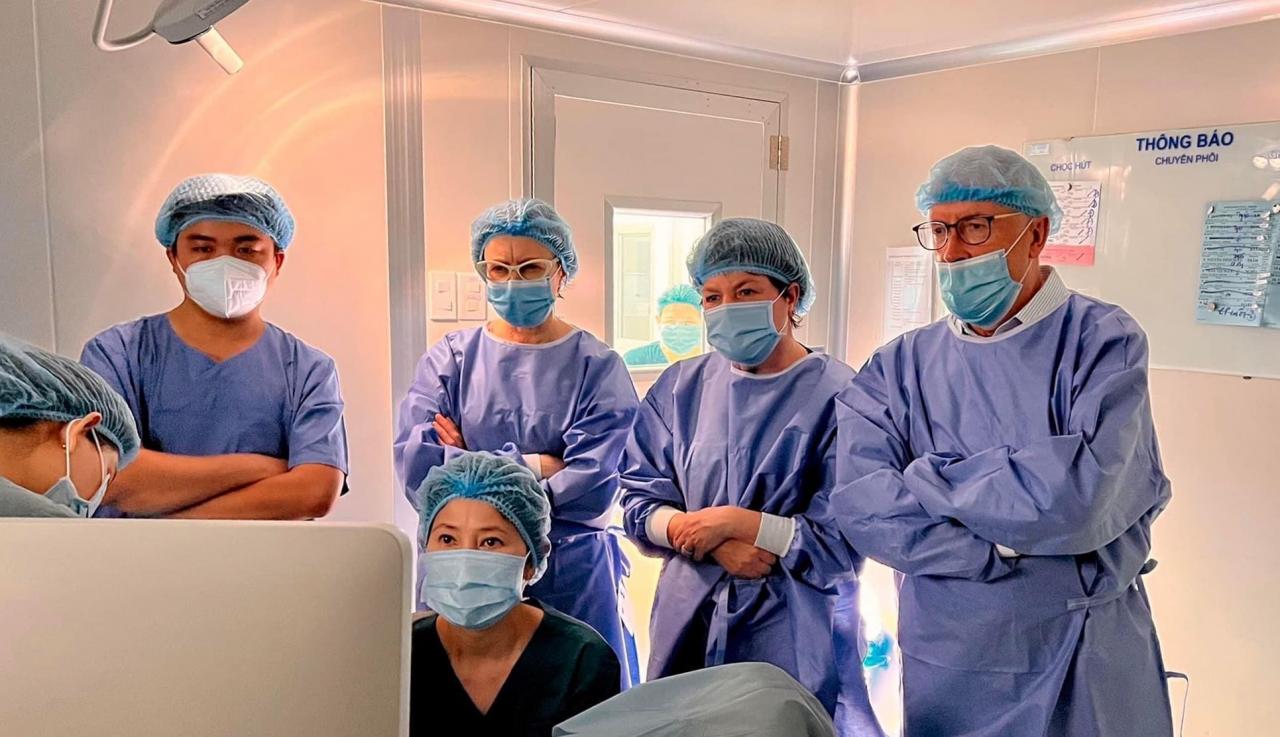
The whole team was tense, paying attention to every step because any small mistake would almost cost the couple their chance of having a child. After the embryo transfer, the wife returned to Italy, forgetting to take a pregnancy test. A month passed, the doctor thought he had failed, then received an email from the wife informing him that her husband had passed away. But after that suffering, this woman happily said that she was pregnant and her husband also knew the good news before he passed away.
This was an extremely difficult case to treat because it was almost the last chance for the husband to leave a life. During 26 years of working, the challenges, hardships, and pressures… have forged a female associate professor who has put Vietnam on the world map in the field of reproductive medicine.
Associate Professor, Dr. Vuong Thi Ngoc Lan is the daughter of Professor, Doctor, Hero of Labor Nguyen Thi Ngoc Phuong - former Director of Tu Du Hospital. "People often ask me if I feel pressured being the daughter of Ms. Phuong - a leading expert in obstetrics. To be honest, for me it is not pressure, but an opportunity and a source of pride. From then on, I grew up with my mother's support and encouragement. I don't need to prove that I am better than my mother, or to erase her shadow", Associate Professor, Dr. Vuong Thi Ngoc Lan said about her journey to pursue obstetrics - following in her mother's footsteps.
From a very young age, Associate Professor Ngoc Lan and the Tu Du Hospital team took the first steps in implementing in vitro fertilization techniques in Vietnam. Twenty years behind the world, Vietnam had its first IVF babies born in 1998. “We are extremely happy to reap the sweet fruit because the team’s mission is to create humans - a future generation of the country. To achieve that result, in the difficult conditions of Vietnam, we were under a lot of pressure to succeed. We worked tirelessly in the lab, ensuring the environment was warm and dry enough, the incubator was rich in CO2, and the light was limited. If you don’t love the job and don’t practice, it would be very difficult to survive at that time,” said Dr. Lan.
The first three babies were born successfully, including one who took the name of Associate Professor Vuong Ngoc Lan and her husband as her middle name (Pham Tuong Lan Thi), becoming a special gift to her.
With that success, along with the increasing infertility rate in Vietnam, Dr. Lan and her colleagues are concerned about "how to increase the success rate of IVF because if 100 people go for treatment and only 13-14 get pregnant, the efficiency is low. How to develop more IVF centers across the country?"
She and her husband (Dr. Ho Manh Tuong) had the opportunity to study a Master's degree in clinical embryology in Singapore. A year later, when she returned, she achieved her initial dream, which was "the pregnancy rate of women undergoing IVF increased 3 times compared to the beginning". After that, this technique was quickly transferred to major hospitals such as the Central Obstetrics Hospital and many other centers. "Up to now, the number of IVF centers in Vietnam has exceeded 50, with many advanced techniques performed, the success rate is quite good, on par with countries in the region and the world", Dr. Lan proudly said.
Since bringing this technique to Vietnam, people do not need to spend 300-500 million VND to go abroad for IVF like before. An IVF procedure in Vietnam now costs 80-100 million VND, only 1/3 to 1/5 less than in developed countries, but that is not enough for Dr. Lan. "There are still many people in difficult circumstances, they do not have enough money to go long distance for IVF because not all initial interventions are successful!"
Every day, in contact with hundreds of patients, understanding the pain of women, she has been looking for answers to the questions that she has devoted much of her time to during her scientific research: is fresh embryo transfer effective and less expensive for patients? Is there any other method that does not require 50% of the cost of drugs used to stimulate the ovaries but has many risks of harming health?
“At the time we were researching fresh embryo transfer and frozen embryo transfer techniques, clinicians around the world were also looking for answers,” said Dr. Lan. Along with the world, doctors conducted research on 800 women at My Duc Hospital.
Previously, centers tended to transfer fresh embryos, but then some reports showed that many cases were not good, pregnancy rates decreased. Some places tend to switch to freezing all embryos in the hope of improving the results. However, freezing all embryos increases costs and delays the patient's chance of pregnancy by several months.
This new study shows that infertile patients (not suffering from PCOS) have a similar high live birth rate when using frozen embryos. This is also very important information for infertile women around the world. The finding may encourage doctors to implant only one embryo at a time, reducing the risk of multiple embryos and related complications when implanting multiple embryos at the same time.
The results of this study by Associate Professor, Dr. Vuong Ngoc Lan and colleagues at My Duc Hospital (Ho Chi Minh City) and Professor Ben Mol, Professor Robert Normal at the University of Adelaide (Australia) were published in the world's leading prestigious medical journal The New England Journal of Medicine on January 11, 2018.
“The world’s leading prestigious medical journal, The New England Journal of Medicine, is where many important clinical research works are published in the world. I never imagined that one day a study in Vietnam would be published in this leading journal. That work resonated around the world, answering the question that many doctors around the world were looking for. We quickly came up with the answer and then it was quickly applied in practice by many countries,” Dr. Lan happily said.
This is the first time a Vietnamese author has presided over, conceptualized, conducted research and published it. This work has brought Associate Professor Dr. Vuong Ngoc Lan into the top 100 Asian scientists in 2020 voted by Asian Scientist Magazine (Singapore). She is also one of three scientists to receive the 2020 Ta Quang Buu Award for outstanding scientific researchers.
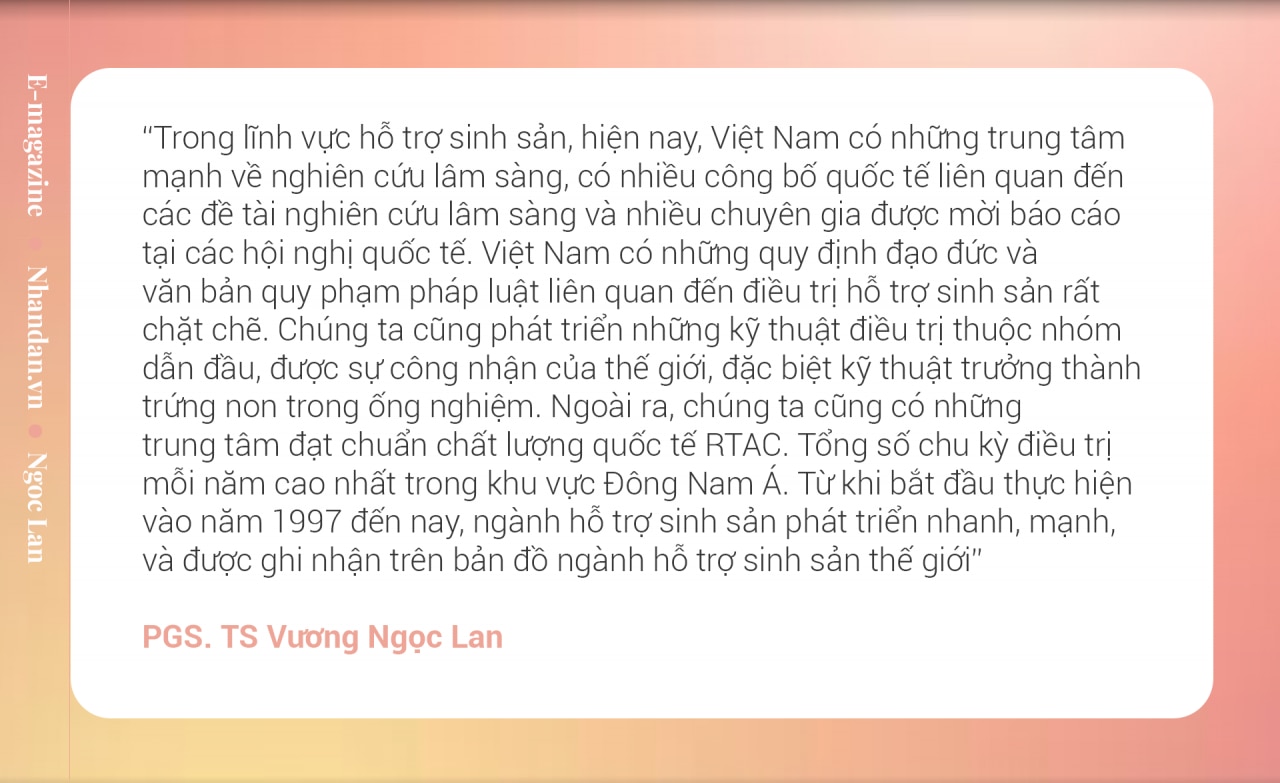
Next in the series of research topics of significance in the field of in vitro fertilization is the series of research topics on in vitro maturation of immature eggs (IVM).
She started this research with a big question, many infertile women have polycystic ovary syndrome. When performing IVF, ovarian stimulation drugs must be used, patients can have an excessive ovarian response, which is life-threatening.
“We conducted an experiment on in vitro maturation of immature eggs (IVM). The pregnant woman does not need to stimulate her ovaries, but only retrieves immature eggs and matures them outside, then creates embryos.
This technique helps achieve two goals at once: reducing complications for women and significantly reducing costs during the process of performing assisted reproductive techniques. Most importantly, IVM achieves a pregnancy rate equivalent to conventional in vitro fertilization. The mother still achieves her wish to have children safely, at a lower cost than conventional in vitro fertilization.
“Although the cost of IVF in Vietnam is low compared to the world, it is still high compared to the salary of Vietnamese people. In IVF, more than 50% of the cost is for the technique of using ovarian stimulation drugs. The technique of immature egg maturation helps reduce the cost by 1/3 to nearly half compared to the conventional IVF method,” Dr. Lan shared.
The IVM technical innovation research project is funded by the Vietnam Foundation for Science and Technology Development. The project series has just been accepted as excellent in 2022 with 6 scientific articles published in prestigious international journals.
“The world recorded the first case born from this IVM technique in 1991, and by 2006, we had the first case of immature egg maturation in Vietnam. In 2017, we began researching improved IVM techniques (CAPA-IVM) and were successful with the first cases. Currently, IVM techniques can only be performed routinely with high success rates in some centers such as the US, Italy, Canada, Korea, Japan, and Vietnam. With the success of improved IVM techniques (CAPA-IVM), Vietnam is considered one of the leading countries in the world in this technique. We have received many requests for technology transfer from centers in the US, Australia, France, India, Singapore, Malaysia, etc.”, Dr. Lan proudly boasted.
There were late afternoons, after leaving the hospital, Associate Professor, Dr. Vuong Thi Ngoc Lan saw many women sitting absent-mindedly in front of the door. They stared at the medical records, their eyes filled with tears because they could not perform their normal duties as mothers. Most of them were elderly women. Among them, there were those who had to spend their whole lives saving money, selling their houses, even borrowing money at high interest rates to find the only chance to become mothers.
When she was researching IVF, Dr. Lan was still very young, she paid more attention to the technical aspects, not yet influenced by the emotions of women. When she gave birth to her first child and raised her child, she understood the feelings and sadness of mothers who had been waiting and yearning to have children for decades.
Associate Professor, Dr. Vuong Thi Ngoc Lan remembers a case, on the 28th of Tet, an elderly woman begged the doctors to try to arrange IVF for her. At that time, the hospital was preparing for Tet holiday, the teams had temporarily stopped working. The woman cried: “I borrowed money at high interest rates to do IVF. If it is delayed, I don’t know if I will still have a chance to have children, will I have enough strength to bear the daily interest?” Doctor Lan held back her emotions, looking at the woman who bet all her assets on treatment, only this last hope left. And she could not take away that woman’s chance. On the 29th of Tet, the whole team completed the embryo placement and after that, the pregnant woman became pregnant.
Working with her husband in the field of in vitro fertilization, Associate Professor, Dr. Vuong Thi Ngoc Lan has long had the thought that when the conditions are right, the couple must do something to support infertile couples facing financial difficulties. The program “Nurturing Happiness” was born from that, as a solid support for infertile mothers who do not have the financial capacity to do IVF.
“We can’t support much, we think it’s better to contribute a little than nothing, a few small things can make a big difference, a few dozen cases a year will eventually have a large number of patients supported. The first year we did free IVF for 30 couples, in the following years, with the contributions of many colleagues, the number of cases receiving free treatment gradually increased,” Dr. Lan confided.
“The way you give is better than what you give”, doctors at My Duc Hospital do not differentiate between patients who receive free support and patients who pay for their own treatment. Since then, the number of free IVF cycles has increased every year, many people in the hospital have joined in contributing to the fund, the success rate of infertile women in the program Nurturing Happiness is very high.
Currently, Associate Professor, Dr. Vuong Thi Ngoc Lan and her colleagues are building a research group specializing in Reproductive Medicine, aiming to become one of the leading research groups in Asia in this field. On this long journey, she always has great support from her family, with her mother and husband also working in the reproductive support profession.
Returning to the sentiment of “being the daughter of mother Phuong has more benefits than pressure”, now, the daughter of Associate Professor, Dr. Vuong Thi Ngoc Lan is also studying medicine. “My mother is like a great teacher, I learned the attitude and spirit of working with all my heart, sacrificing my personal time to best serve the patients. I also hope that my daughter has continued to choose the path of her, of her parents,
"Continue the mission of serving and caring for patients, thinking of the patients first," Dr. Lan expressed.
- Production organization: Viet Anh
- Performed by: Thien Lam
- Presented by: Thi Uyen
Nhandan.vn


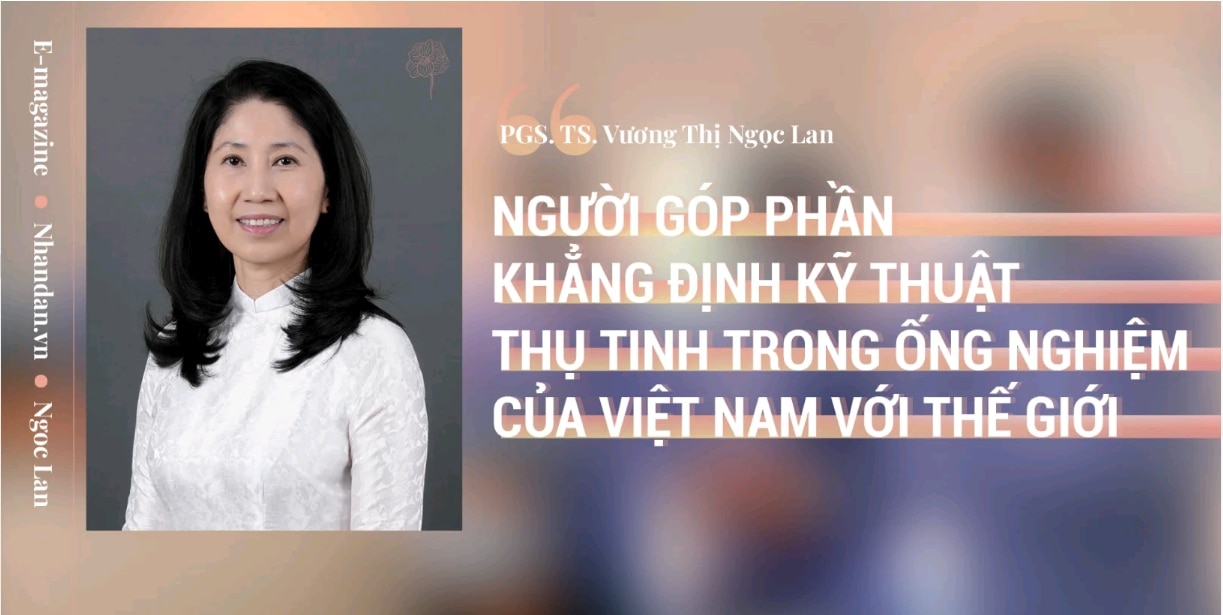

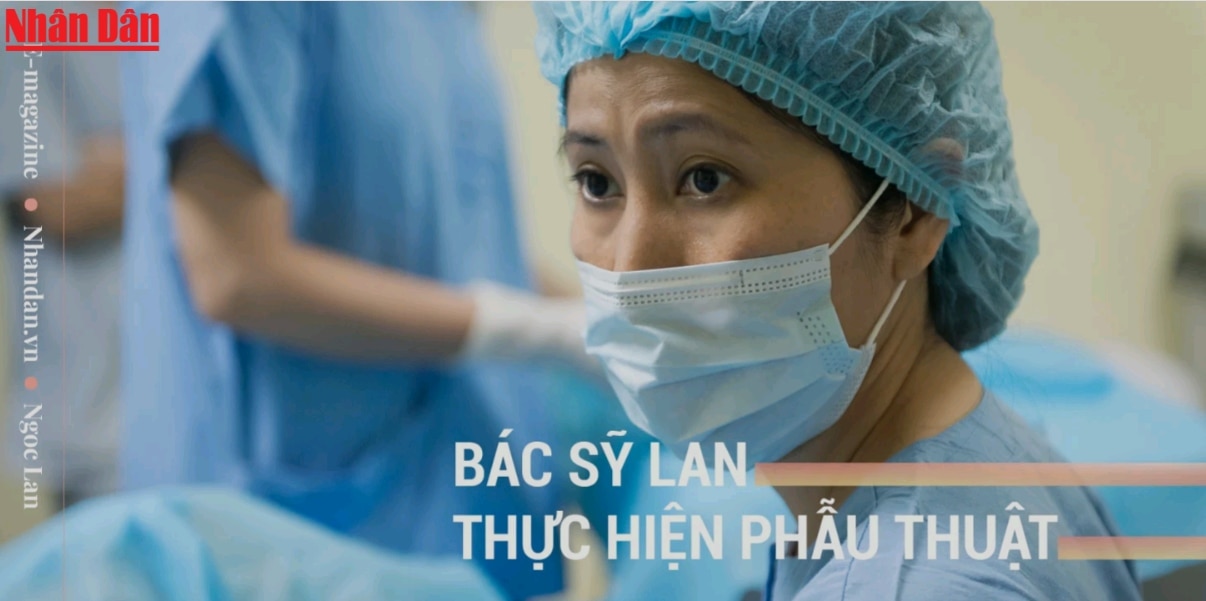




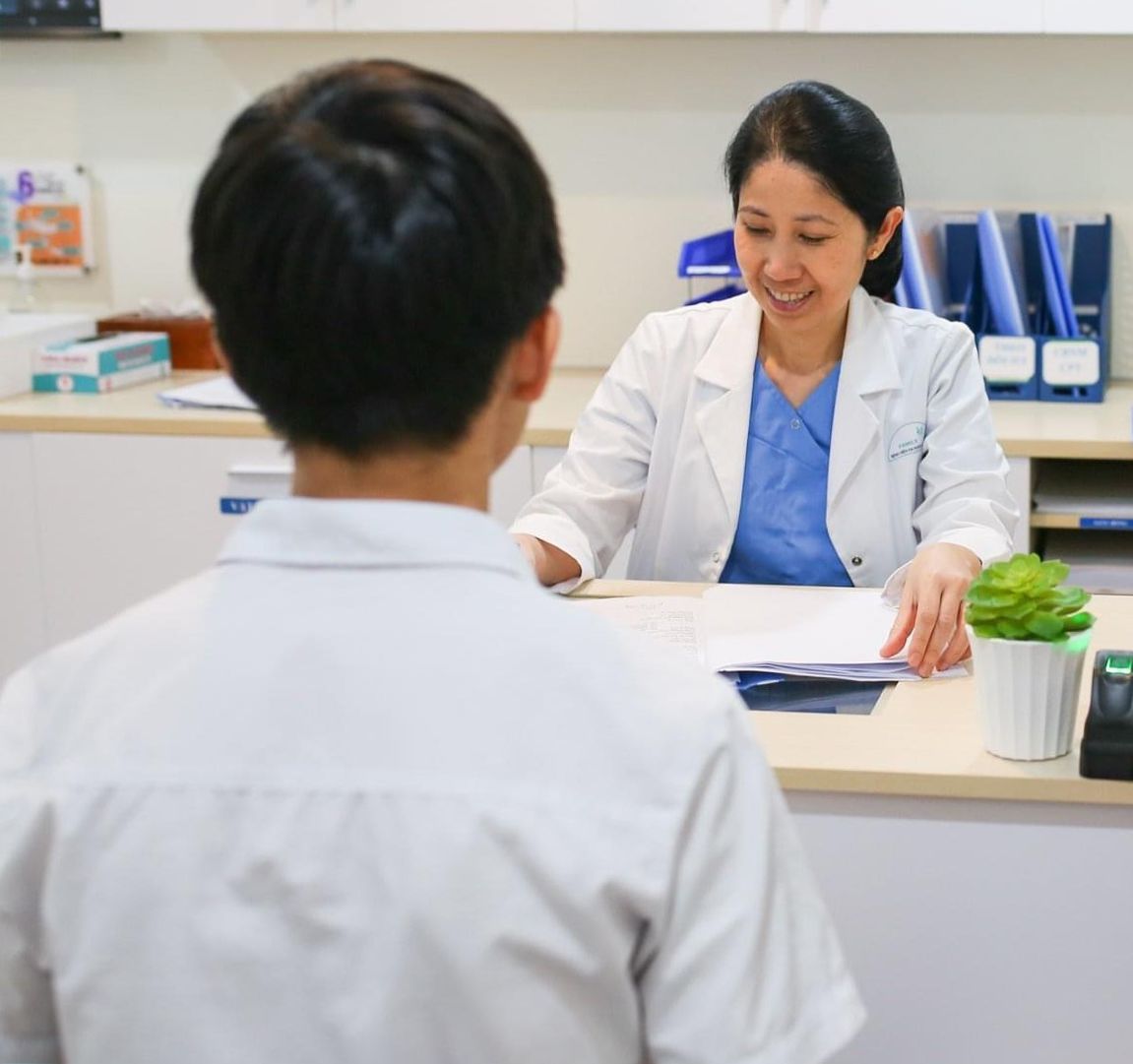

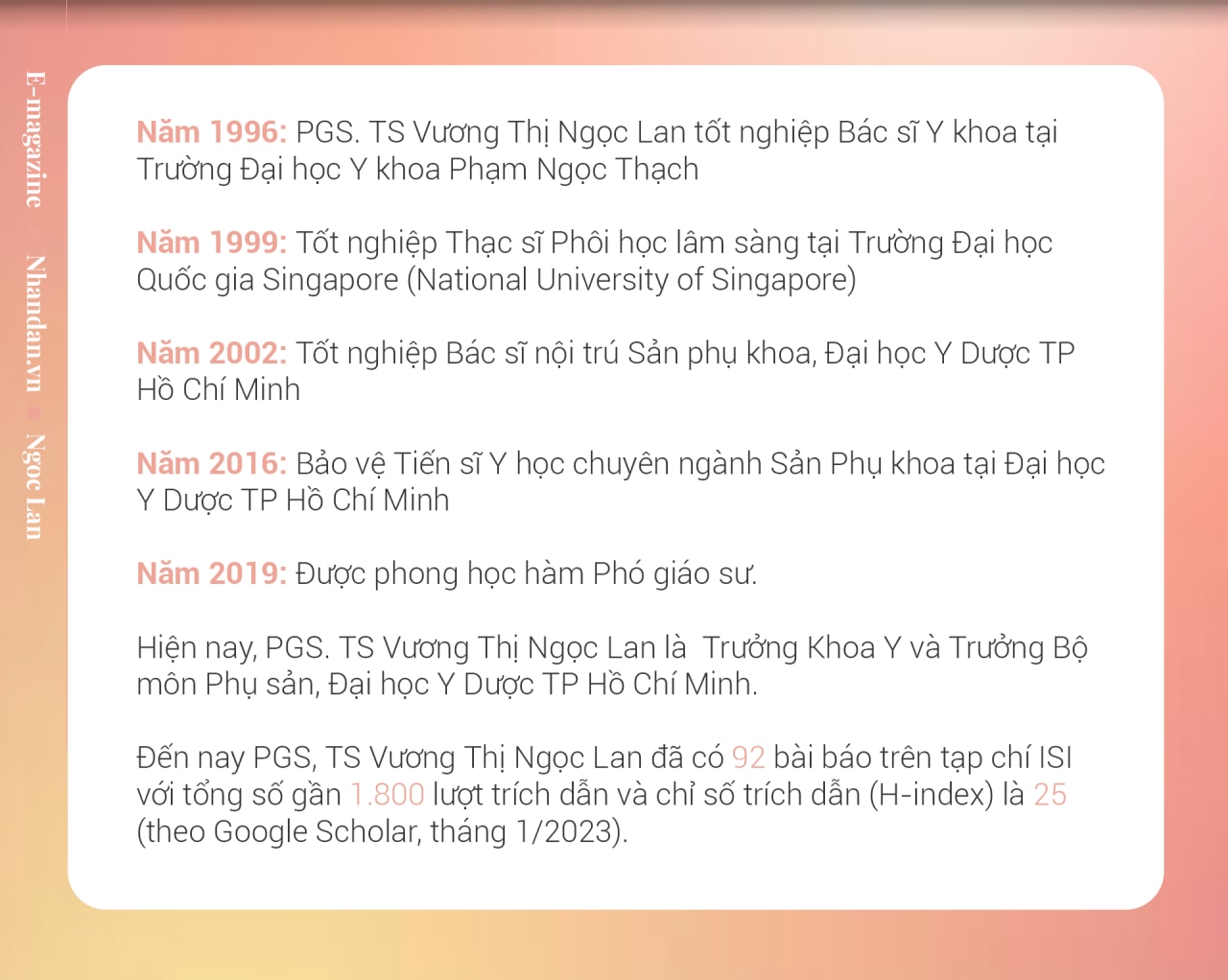



![[Photo] Prime Minister Pham Minh Chinh chairs conference on anti-smuggling, trade fraud, and counterfeit goods](https://vphoto.vietnam.vn/thumb/1200x675/vietnam/resource/IMAGE/2025/5/14/6cd67667e99e4248b7d4f587fd21e37c)


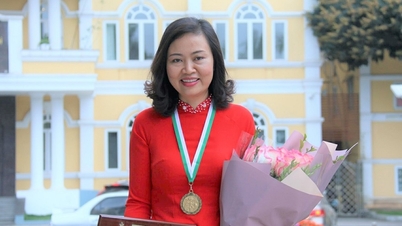
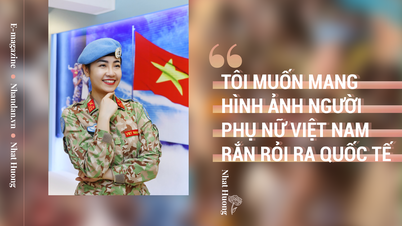



















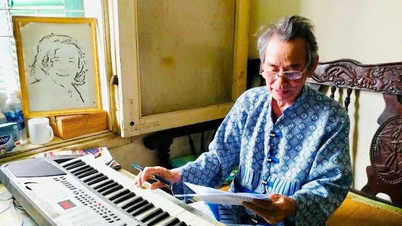
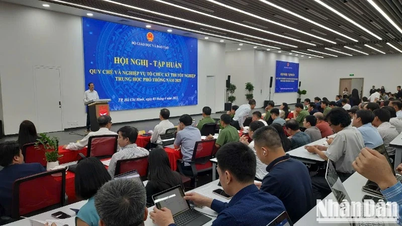
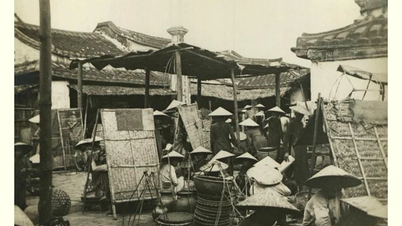

























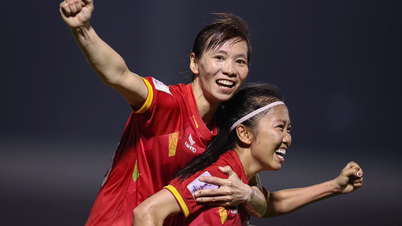
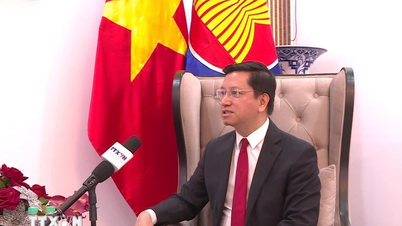

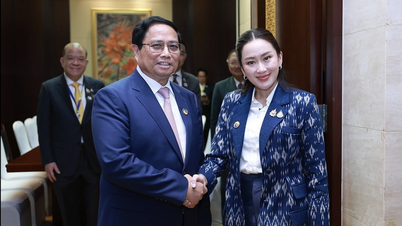













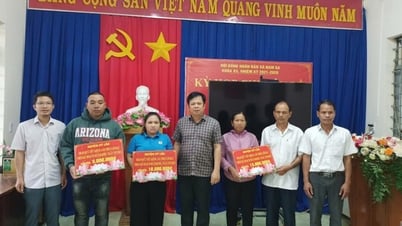















Comment (0)